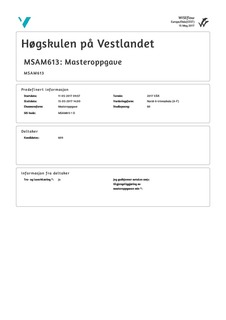«It starts at home» Gender and Education in Swaziland
Master thesis
Permanent lenke
http://hdl.handle.net/11250/2481606Utgivelsesdato
2017-05-15Metadata
Vis full innførselSamlinger
Sammendrag
The theme for this master’s thesis is gender and education in Swaziland. Swaziland is a small kingdom bordering to South Africa and Mozambique. Traditionally, this is a patriarchal society. It has one of the highest rates of HIV/AIDS in the world. One in three women have reported experiencing sexual abuse before the age of 18. My master’s thesis address how adolescents’ lives are structured by their gender, and to what degree there are gender equality at a secondary school in Swaziland. The school is understood as closely linked to the rest of the society. The data is collected during a fieldwork that lasted for two months. The first moth I interviewed some adolescents outside school. The second month was spent at a secondary school, where I used different forms of interviews, participant and non-participant observation, and student texts, to collect my data. To understand what is expected of women and men in Swaziland, I have examined what my informants see as prototypically masculine and feminine, through how they describe family marriage, relationship and future dreams. In addition, I have used Bourdieu’s forms of capital to show how men and women may gain a position in society in a gendered way. I have compared how teachers and students understand gender equality in education, and have examined how girls and boys perform their gender through my observations. The main conclusion is that the lives of students are likely to be structured by their gender. While boys see themselves as head of household and a provider, girls will most likely have to take care of the reproductive tasks in a household. All the girls opt for their own income. There is gender equality at the school to a certain extent, however, girls and boys seem to perform their gender differently. The school contribute to gender equality in a passive way through giving the same opportunities to both girls and boys. As the title suggest, this research, found that the main differences between women and men are found in the household. Gender differences originate from the home, and have to be addressed also in the context of family and home. Denne oppgåva handlar om kjønn og utdanning i Swaziland. Swaziland er eit lite kongedømme som grenser til Sør Afrika og Mosambik. Dette er tradisjonelt sett eit patriarkalsk samfunn. Swaziland er blant dei landa med høgast tall for HIV/AIDS. Ei av tre kvinner har opplevd seksuelt misbruk før dei fyller 18 år. Masteren min undersøker korleis liva til ungdommar vert strukturert av kjønnet deira, og i kva grad det er likestilling på ein ungdomsskule i Swaziland. Materialet mitt har blitt samla inn iløpet av eit to månader langt feltarbeid. Den første månaden blei brukt til å intervjue nokre ungdommar utanfor skulen. Den andre månaden var eg på ein ungdomsskule. Der brukte eg ulike metodar for å samle inn data: ulike intervjuformer, deltakande og ikkje-deltakande observasjon og eg samla inn tekstar frå studentar. For å forstå kva som er forventa av menn og kvinner i Swaziland, har eg undersøkt kva informantane mine ser som prototypisk maskulint og feminint, gjennom korleis dei har skildra familie, ekteskap, og framtidige draumar. Eg har også brukt Bourdieu sitt kapital-omgrep for å vise korleis menn og kvinner kan oppnå status i samfunnet. Eg har samanlikna elevar og lærarar sine syn på likestilling, og korleis elevar utfører kjønnsrolla si på skulen. Hovudkonklusjonen i denne oppgåva er at mest sannsynleg vert liva til ungdommar strukturert av kjønnet deira. Medan gutar forventar å bli «familiens overhode» og forsørgjar, må jenter mest truleg ta seg av reproduktive oppgåver i heimen. Alle jentene eg intervjua ynskjer å ha si eiga inntekt. Det er til ein viss grad likestilling på skulen, men jenter og guter oppfører seg ulikt. Skulen bidrar til likestilling på ein passiv måte, gjennom å tilby jenter og gutar like moglegheiter. Slik ein kan sjå i tittelen på oppgåva, er dei største forskjellane mellom kjønna i heimen. Likestilling i samanheng med familie og heim må bli snakka om.
Beskrivelse
Masteroppgave i samfunnsfagdidaktikk

